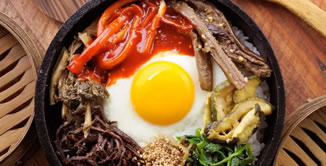

Healthy Korean Foods to Include in Your Diet
Korean cuisine is not only renowned for its bold and vibrant flavors but also for its health benefits. Rich in vegetables, fermented foods, and balanced nutrition, it's an ideal choice for those looking to maintain a healthy diet without compromising on taste. This guide showcases some of the healthiest Korean foods you can incorporate into your daily meals, along with recommended spots in Seoul where you can savor these nutritious dishes.
**Kimchi**, Korea’s iconic fermented vegetable dish, is celebrated for its probiotic properties. Packed with vitamins A, B, and C, it's a gut-friendly addition that aids digestion and supports the immune system. To try authentic kimchi made from traditional recipes, visit **Jang Mo Jip** in Seoul’s Apgujeong area, where you can enjoy a range of kimchi varieties alongside an array of other Korean dishes.
Another healthful option is **Bibimbap**, a harmonious blend of rice, seasonal vegetables, lean protein, and gochujang (chili paste). This colorful dish is rich in fiber and antioxidants, making it a well-rounded meal that boosts energy and provides essential nutrients. For an authentic experience, head to **Jeonju Jungang Hoegwan** in Myeongdong, Seoul, known for its traditional presentation of bibimbap, staying true to its roots from Jeonju, the dish’s place of origin.
**Doenjang Jjigae**, a savory soybean paste stew, offers a warm, comforting bowl brimming with protein, minerals, and dietary fiber. Made with fermented soybean paste, tofu, and vegetables, this stew is an excellent choice for a nourishing and hearty meal. **Cheongdam Kanjang Kongnamul-guk** in Gangnam is highly recommended for its flavorful and satisfying doenjang jjigae, prepared using the freshest ingredients.
For those in search of lean protein, **Samgyeopsal**—grilled pork belly—when enjoyed in moderation, is a delicious way to include heart-healthy fats in your diet. Pairing the juicy slices with fresh greens and garlic enhances the meal’s nutritional value. **Mapo Galmaegi** in Mapo-gu is famed for serving high-quality, carefully sourced pork belly, offering a dining experience that prioritizes both taste and health.
If you're seeking something light yet filling, **Japchae** is a superb choice. Made from sweet potato starch noodles and mixed vegetables, this dish is not only gluten-free but also low in calories. The stir-frying method preserves the nutrients more effectively than boiling. Experience authentic japchae at **Sanchon**, a temple food restaurant in Insadong, which emphasizes fresh, organic ingredients.
Incorporating these healthy Korean foods into your diet not only introduces a variety of flavors and textures but also supports your overall well-being, thanks to their nutrient-dense ingredients. Exploring these dishes at reputable Seoul restaurants provides a deeper understanding of Korea's culinary culture, showcasing how traditional recipes can be both delicious and health-conscious.
